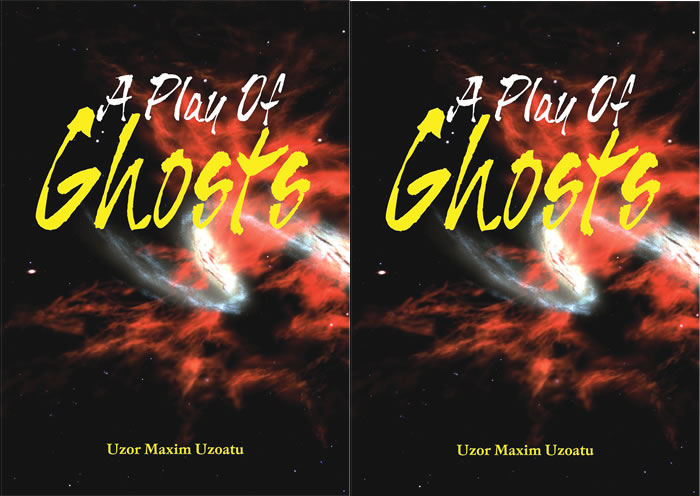A review of Uzor Maxim Uzoatu’s A Play of Ghosts by Michael Jimoh.
THE players in this play, ‘A Play of Ghosts’ by Uzor Maxim Uzoatu, are all actors starring in their own show to incite a long overdue revolution. Thus, there is a Producer, an Author, a Heroine, her brother and two prostitutes. All of them can barely eke out a living. A counterpoint to them is a vacuous landlord cum politician called Alhaji – representing the propertied class.
Using the stage to foment rebellions is as old as drama itself. Usually deployed against the state or constituted authority, actors, writers and the lot have since employed such tactics to avoid charges of sedition. There is the added advantage of making the audience understand that the entire transaction is to be taken at face value. Still, the underlying message(s) would have been passed along, however discreetly.
In ‘A Play of Ghosts’, Uzoatu has availed his characters of a readymade medium to vent their collective spleen on a tyrannical and unfeeling class – to great effect. From the onset, the characters call themselves ghosts, effectively making them and, by extension, the playwright not liable for any traffic on stage, however unpalatable the subject may be.
Most revolutions in the world often begin innocuously, from insignificant incidents that would later change the course of history. It is so in ‘A Play…’
After the death of their father, brother and sister, Mentalo and Victoria, are unable to pay their rent. There is already a letter of eviction from the landlord, Alhaji. Thrown in the mix is a misty-eyed lover by name Kema who is also the Author. The landlord himself is a secret admirer of Victoria. He is a polygamist but Victoria does not wish to be spouse number X.
Utterly besotted with Victoria (Heroine), Kema lacks the required resources to start a lasting relationship with her. Worse still, Mentalo reviles him because of his indigent condition, not that Mentalo is any better than Kema, though. On her part, Victoria is torn between his love for Kema and her desire to better her situation. Prompted by Mentalo, she opts for the second. Her life takes on a downward spiral from that point, as she graduates from being a hard-drinking murderess to the proprietress of a bordello.
The grist for any drama worth staging – conflict, love, death, confrontation and resolution – are so expertly woven together by Uzoatu that readers get a sense of what minimalism ought to be. Broken by life and circumstances, some of the characters take to drinking and whoring – with biblical and philosophical justification. “Give strong drink to him who is perishing, and wine to those in bitter distress…” Mentalo consoles himself, quoting the book of Proverbs, but never for once forgetting the imminent war against the oppressors.
For sheer bravado and originality, Mentalo – though his name suggests a loony – has a certain appeal to readers. Educated unemployed idlers, for instance, would most certainly identify with him. Almost every page in A Play drips with brilliance. Lola, one of the prostitutes lodged in Hotel Victoria, where most of the action takes place, dismisses Mentalo’s misogyny as a combo of “the tough talking of emergency revolutionaries with the rabid sentimentality of an undersexed refugee.”
With irreverent humour but never farcical, often mordant wit and a knack for philosophical ripostes, Uzoatu presents credible characters who understand why they must rid themselves of the shackles of oppression.
A sagely figure, Producer is the intellectual arrowhead of the revolution though he sometimes acts as a leash on the excesses of others. He owns the house on Kimathi Street – a nod to The Trial of Dedan Kimathi by Ngugi wa ‘Thiongo – a sort of training school for prospective revolutionaries. Where his disciples are hotheaded, Producer offers some bit of temperance, ever ready with a wise counsel or protection for a potential victim.
In the closing scene, Mentalo charges at Alhaji for killing Victoria but the politician/ landlord is saved physically by Producer. Kema tells Mentalo to look beyond doing physical harm. “We fight for life and victory does not exist by itself. Victory lies in struggle and the will to go the distance.”
Brief as it is – 64 pages in all – ‘A Play…’ will surely go a long way in the history of revolutionary drama as one of the most potent depictions of class struggle between the rich and the have-nots in Nigeria.
- Jimoh is a Lagos-based writer and literary journalist
WATCH TOP VIDEOS FROM NIGERIAN TRIBUNE TV
- Relationship Hangout: Public vs Private Proposals – Which Truly Wins in Love?
- “No” Is a Complete Sentence: Why You Should Stop Feeling Guilty
- Relationship Hangout: Friendship Talk 2025 – How to Be a Good Friend & Big Questions on Friendship
- Police Overpower Armed Robbers in Ibadan After Fierce Struggle






